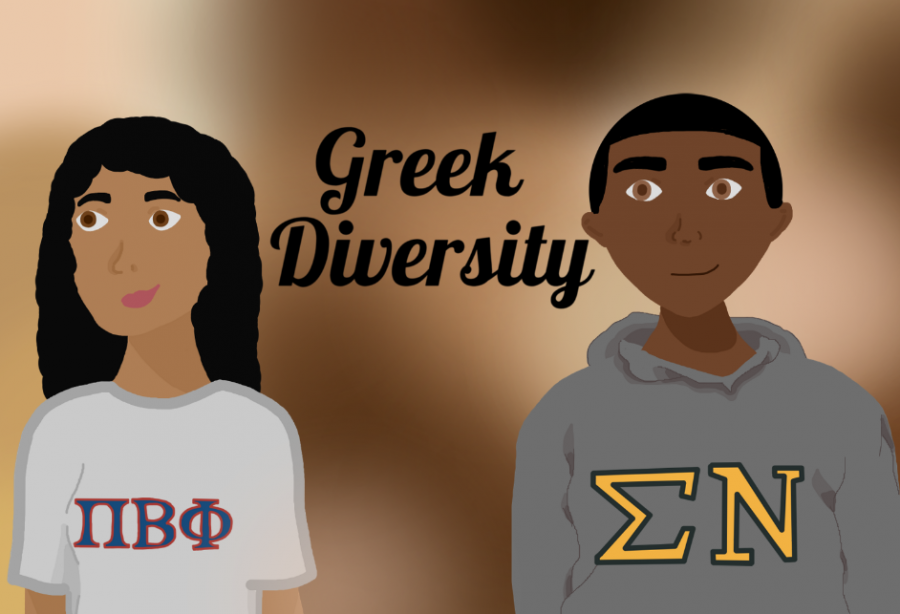OPINION: Greek community needs to prioritize members of color
Greek community needs to overcome the stigmas, prejudices associated with members of color
The WSU Greek community needs to get over years of ingrained racism and accept members of color into their ranks.
September 9, 2020
The Multicultural Greek Council at WSU is made up of 14 organizations. Each was created with diverse goals and values, all with the intent of providing a space of cultural connection for people of color on the university’s campus. This connection needs to be the priority, however, and members of color need to feel welcomed in the Greek community.
One member of the MGC community, Shantel Gutierrez, sought this exact kind of community, when going through Panhellenic recruitment.
“I felt like I didn’t exactly connect in the same ways I could with MGC just because I had had different life experiences growing up,” Gutierrez said.
When Gutierrez discovered Sigma Lambda Gamma National Sorority Inc., however, she admired their obvious focus on women empowerment and their pursuit of academic excellence.
This historically Latina-based national sorority is just one of the many historic chapters chartered on WSU’s campus. Its presence ensures that there is another place for young women to seek community. The creation of Sigma Lambda Gamma National Sorority Inc. and all other MGC organizations was made possible by the National Pan-Hellenic Council (NPHC).
Originally created by Black students who were isolated from historically-racist Greek chapters on their campuses, the NPHC paved a road to demanding diversity in Greek Life. The nine original NPHC organizations, known as the Divine 9, ensured African American students had access to organizations that furthered their educational, social and cultural interests.
Prior to their existence, these students lacked an outlet for connection, and missed out on many positive aspects of Greek life – another denial of basic rights. The African American Greek-letter organization movement became a place that encouraged brotherhood or sisterhood all in the name of positive social change and communities for students of color, according to the NPHC website.
Now, our university’s MGC exists to accomplish the same for all students of color. There is a home for everyone seeking a community with the same values. Despite similarities in these values, the Panhellenic, Interfraternity and Multicultural Greek communities are still divided by a failure to prioritize connections between each individual council.
Many members like Gutierrez are considering ways to bring the three parts of the Greek community together; one of which is through joint-philanthropies.
“A cross-organization fundraiser is a really good way to, one, socialize and get to know each other, and, two, actually do something that’s for a good cause,” Gutierrez said.
Events like the fundraiser serve to bring our members together for one purpose and remind us of the most important role of our community: to do good for others.
As important as it is to become more acquainted with the other Greek organizations on campus, it is equally vital that we learn more about what each stands for. WSU’s Greek students have a unique opportunity to learn more about many diverse cultures in the most honest way. They can learn from people their age, who are also seeking a community and opportunities to grow.
By creating new avenues for connection between our three communities, we are only heightening that opportunity for growth. Particularly with the incoming class of Greek students, it’s obvious that they are determined to contribute to the community in these positive ways.
“They’re so full of ideas and ways to connect,” said Chi Omega President Mia Burke, referring to the new members of the Greek community.
Even with the new obstacle of COVID-19, our community has an opportunity to get creative. The members of WSU Greek life are not backing down from the challenge.
It is so important at this time in United States’ history to grasp opportunities for new experiences. If we are going to overcome the stigmas that still stand between different communities – whether we see them or not – we have to start taking steps to truly do so.
I implore my fellow Greek students to consider how their membership in a Greek organization or chapter could be made even more meaningful by stepping further out of their comfort zone than to befriend another IFC member or Panhellenic sister.
This is the time to do something new in our community. To continue to challenge ourselves to be more inclusive, and use our access for a greater purpose.










kat roley • Sep 9, 2020 at 10:28 am
i think you need to do a little more research, because tri delta did join with a multi cultural chapter and did a joint philanthropy event. also there are things in the works to have the MGC chapters join more pan and ifc events.